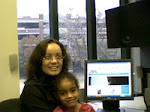Hi Literacy AmeriCorps members!
Just a reminder that we will review and discuss our questionnaire and assessments during Friday's training at Loyola. These are the items we discussed during the last LAC training:
Administer the following to a minimum of two learners at your literacy site:
1. Learner Questionnaire
(This was optional is there was something similar already in the learner's file.)
2. San Diego Quick Assessment
(This determines the independent, instructional and frustration reading level of your learner.)
3. Timed oral reading test (This assesses fluency - accuracy and rate.)
If you have any questions that need to be addressed before the meeting Friday, send me an email. During the meeting, we will review the assessments so please be prepared to share your experience with the group.
Happy reading!
Hazel
Subscribe to:
Post Comments (Atom)



4 comments:
The San Diego Quick Assessment is most efficient for correctly diagnosing a low level reader. The Learner Questionnaire can be improved, however.
-Michel
The oral timed reading was helpful in getting an idea of the learner's reading ability and it also created an interest and a desire to improve.
The reading assessments were very interesting and useful. Using the questionnaire as an ice breaker, we were able to open up a dialogue with one of our students in particular, about his goals and the obstacles he needs to deal with in order to reach these goals.
The San Diego quick assessment allowed us to identify certain sounds/letter combinations that our students have trouble with.
The whole process also reinstated how important it is for our students to have individual attention. They seemed to really appreciate the one on one dialogue.
I gave my students the learner questionnaire and thought that for the most part it was pretty informative. The main thing I think I would change for ELL students would be more focus on finding out the details of their past schooling. Because the same short answer on the survey might mean different things for people from the United States versus people from other countries, not digging deeper might end up being misleading.
Post a Comment